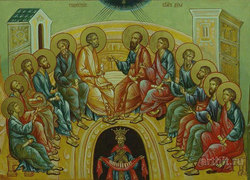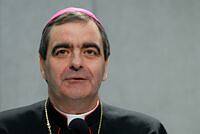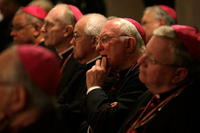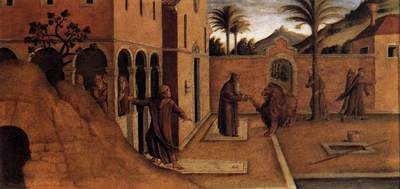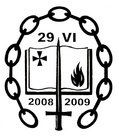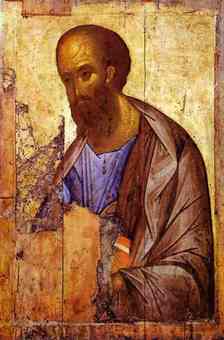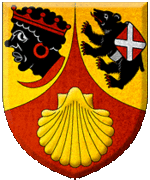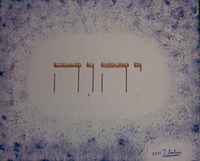Today the press office of the Holy See published the names of those the Pope asked to
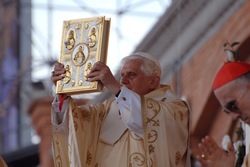 assist the work of the 12th Ordinary General Assembly of the Synod of Bishops being held in Rome October 5-26, 2008. The Synod will be dealing with the topic of “The Word of God in the Life and Mission of the Church.”
assist the work of the 12th Ordinary General Assembly of the Synod of Bishops being held in Rome October 5-26, 2008. The Synod will be dealing with the topic of “The Word of God in the Life and Mission of the Church.”
Pope Benedict’s Janaury 21st address to attending the general meeting for the Synod is here. In the address, the Holy Father says: “Among the Ecclesial Community’s many and great duties in today’s world, I emphasize evangelization and ecumenism. They are centred on the Word of God and at the same time are justified and sustained by it. As the Church’s missionary activity with its evangelizing work is inspired and aims at the merciful revelation of the Lord, ecumenical dialogue cannot base itself on words of human wisdom (cf. I Cor 2: 13) or on neat, expedient strategies, but must be animated solely by constant reference to the original Word that God consigned to his Church so that it be read, interpreted and lived in communion with her.”
On Sunday October 5, at 9:30 a.m., in the Basilica of St. Paul’s Outside-the-Walls, Pope Benedict will open the Synod.
The list of the Ordinary members with the assistance of experts and auditors is extensive and likely to be meaningless for many but there are some names that we ought to raise an eyebrow and say, “Well….” Of interest to me and perhaps to you are the following:
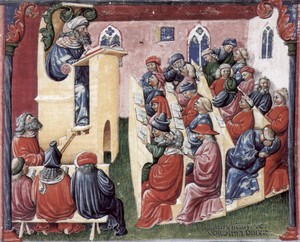
Ordinary members
-Marc Cardinal Ouellet, P.S.S.
–Bishop Vincenzo Paglia, Bishop of Terni-Narni-Amelia, Pres. of the Catholic Biblical Federation
-Very Rev’d Fr. Adolfo Nicolás, S.J., Superior General of the Society of Jesus
-Rev’d Fr. Julián Carrón, President of Communion and Liberation
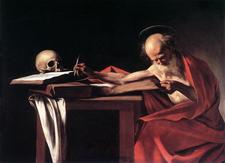 Experts
Experts
-Rev’d Fr. Peter Damian Akpunonu, Mundelein Seminary, Mundelein, IL
-Rev’d Fr. Enzo Bianchi, Prior of the Monastic Community of Bose, Italy
-Rev’d Sr. Sara Butler, M.S.B.T., Professor of Dogmatic Theology, St. Joseph Seminary, NY
-Rev’d Fr. Juan Javier Flores, O.S.B. Pres. of the Pontifical Liturgical Institute, Rome
-Rev’d Fr. Stephen F. Pisano, S.J. Rector of the Pontifical Biblical Institute (from the USA)
-Rev’d Fr. Marko Rupnik, S.J., Director of the Ezio Aletti Center for Studies & Research, Rome
-Rev’d Sr. Germana Strola, O.C.S.O., Trappist nun of the Vitorchiano Abbey, Italy
-Rev’d Fr. Cyril Vasil, S.J., Rector of the Pontifical Oriental Institute, Rome
-Rev’d Mons. Timothy Verdon, Professor of Sacred Art, Theological Faculty of Central Italy, Florence (from the USA)
-Prof. Michael Waldstein, Professor of NT, International Theological Institute for Studies on Marriage and Family, Gaming, Austria (citizen of the USA & Austria)
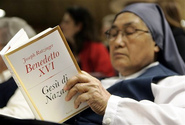
Auditors
-Carl Anderson, Supreme Knight of the Knights of Columbus (from the USA)
-Luis F. Figari, Superior General of the Sodalitium Vitae Christianae (from Peru)
-Abbot Michel Jorrot, O.S.B., Abbey of Clervaux (from Luxemburg)
-Rev’d Mother Clare Millea, A.S.C.J., Superior General of the Apostles of the Sacred Heart (from the USA)
-Andrea Riccardi, Founder of the Community of Sant’Egidio (from Italy)
-Maria Voce, Pres. Of the Focolari Movement (from Italy)
Interesting to note that there are no bishops from the USA among the Ordinary members of the Synod. Plus, a number of the experts already sit on the International Theological Commission which is under the auspices of the CDF. One can also appreciate the presence of the ecclesial movements participating in the Synod!
 to the sacred Scriptures. This synod and our study of the Bible is essential to our spiritual life and our life in the Catholic Church, so spend time with materials that will broaden your scriptural horizon. The synod and the Year of Saint Paul are apt for our times.
to the sacred Scriptures. This synod and our study of the Bible is essential to our spiritual life and our life in the Catholic Church, so spend time with materials that will broaden your scriptural horizon. The synod and the Year of Saint Paul are apt for our times.